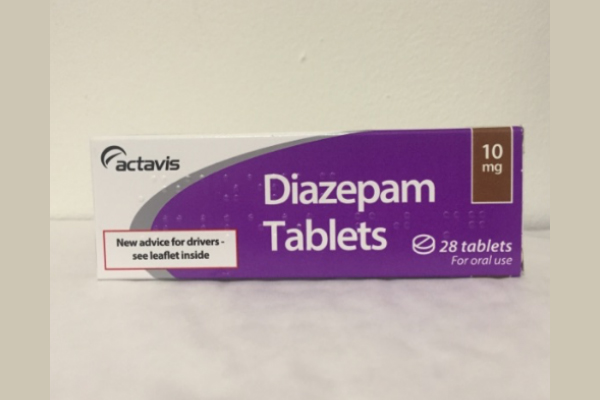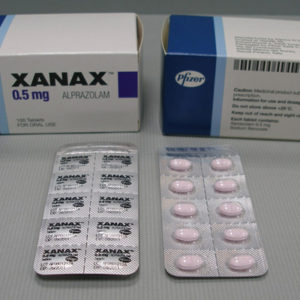Description
How does Diazepam 10mg Actavis work? What are its effects ?
Diazepam 10mg Actavis belongs to the class of drugs called benzodiazepines. It is used for the short-term relief of symptoms associated with mild to moderate anxiety or alcohol withdrawal (such as agitation). It is also used to relieve muscle spasms. It works by slowing down the nerve activity of the brain (the central nervous system).
The injectable form of this medication is used to control prolonged epileptic seizures.
This medication is available under different brand names or under different presentations, or both. A specific mark of this medication may not be available in all forms or be approved for any of the conditions discussed herein. In addition, certain forms of this medication may not be used against all the conditions mentioned in this article.
Your doctor may have suggested this medication for a condition not listed in this medication information article. If you have not yet discussed this with your doctor, or if you have any doubts about why you are taking this medication, consult it. Do not stop taking this medicine without consulting your doctor.
Do not give this medicine to anyone, even someone who suffers from the same symptoms as yours. This medication may be harmful to people for whom it has not been prescribed.
What form (s) does Diazepam 10mg Actavis come in?
Each pale yellow, cylindrical, biplane, beveled edged tablet with the inscription “ROCHE” above “5” engraved on one side and a break bar on the other, contains 5 mg of diazepam. Nonmedicinal ingredients: corn starch, lactose, yellow iron oxide and magnesium stearate. Gluten-free, paraben, sodium, sulfite or tartrazine.
How should I use Diazepam 10mg Actavis?
The recommended dose of diazepam for adults varies from 2 mg to 10 mg, taken 2 to 4 times a day. For children over 6 months, the initial dose usually ranges from 1 mg to 2.5 mg taken 3 to 4 times a day.
It is important that the dose be tailored to your personal needs to avoid excessive sedation or motor impairment.
Diazepam 10mg Actavis is normally used for a short period of time or as needed. It can cause a state of dependence if it is taken for long periods. If you are taking this medication regularly for some time (eg more than a month), do not stop taking it without first talking to your doctor. To avoid weaning effects, a gradual reduction in dose is recommended before stopping.
There are a number of factors that can be used to determine the dose that a person needs: weight, health, and other medications. If your doctor has recommended a dose other than those listed here, do not change the way you take the medication without consulting it first.
It is important to use this medication exactly as your doctor has told you. If you miss a dose, take it as soon as you remember, and take the medication as soon as possible. If your next dose is scheduled in less than 6 hours, do not worry about the missed dose and take the usual dosage schedule. Do not use a double dose to make up for a missed dose. If you are unsure what to do after you miss a dose, ask your doctor or pharmacist for advice.
Store Diazepam 10mg Actavis at room temperature away from moisture. Keep it out of the reach of children.
Do not dispose of medicines into the waste water (eg not in the sink or in the toilet bowl) or in household waste. Ask your pharmacist how to get rid of unused or outdated medications.
What is it used for?
Do not use diazepam under the following conditions:
An allergy to diazepam or to any of the ingredients of the medication;
An allergy to any other benzodiazepine;
Acute angle-closure glaucoma;
A liver disorder;
Myasthenia gravis;
Severe breathing difficulties;
The presence of sleep apnea.
Do not give this medicine to children who are not yet 6 months old.
What side effects may I notice from Diazepam 10mg Actavis?
Many medications can cause side effects. A side effect is an adverse response to a drug when taken at normal doses. It can be mild or severe, temporary or permanent. The side effects listed below are not experienced by anyone taking this medication. If you are concerned about side effects, discuss the risks and benefits of this medication with your doctor.
At least 1% of people taking this medication have reported the following side-effects. Many of these side-effects can be taken care of and a few can go away on their own with time.
Consult your doctor if you experience these side-effects and if they are severe or bothersome. Your pharmacist may be able to advise you on what to do if side effects occur:
Blurred vision;
Clumsiness or instability;
Constipation;
Dizziness or lightheadedness;
Drowsiness;
headaches;
Muscle weakness;
Of slurred speech.
Most of the side effect listed below do not happen very often, but they could cause serious problems if you do not see your doctor or if you are not receiving medical attention.
Check with your doctor as soon as possible if any of the following side effect occur:
Anxiety or agitation;
Confusion;
Falls and fractures;
Fast, very strong or irregular heartbeat;
Hallucinations (eg the illusion of hearing or seeing something that does not actually exist);
Memory holes;
Changes in mood or behavior (eg, aggressiveness, rabies, anxiety or excitement);
nightmares;
Signs of depression (eg, lack of concentration, weight fluctuations, sleep disturbances, indifference to many activities, suicidal thoughts);
Stop taking the medication and seek immediate medical attention if there is a response such as:
Signs of a severe allergic reaction (eg, abdominal cramps, difficulty breathing, nausea and vomiting, or blistering of the face and swelling of the throat).
Some people may experience side effect other than those listed. Check with your doctor if you notice a symptom that worries you while you are using this medicine.
Are there any other precautions or warnings for Alzheimer’s?
Before using any medication, be sure to tell your doctor about any medical conditions or allergies you may have, any medications you are using, and any other important facts about your health. Women should mention if they are pregnant or if they are breastfeeding. These factors may affect how you should use this medication.
Alcohol use: You should avoid drinking alcohol while taking diazepam. The combination of alcohol with this medication may cause an increase in adverse reactions associated with diazepam use, including slowing breathing or heart failure. People who are addicted to alcohol, or to medications, should not use diazepam except with rare exceptions and under medical supervision.
Dependence and withdrawal: Benzodiazepines such as diazepam can lead to physical dependence (the need to take regular doses to prevent the onset of physical symptoms). Severe withdrawal symptoms may occur if the dose is considerably reduced or suddenly interrupted. These symptoms include convulsions, irritability, nervousness, sleep disorders, restlessness, tremors, diarrhea, abdominal cramps, vomiting, memory problems, headaches, Muscle pain, extreme anxiety, tension, restlessness and confusion. A gradual reduction of the dose under medical supervision can prevent or alleviate these withdrawal symptoms.
A rebound anxiety may also occur if the diazepam treatment is not interrupted suddenly. Rebound anxiety is a transient syndrome in which the symptoms leading to treatm



